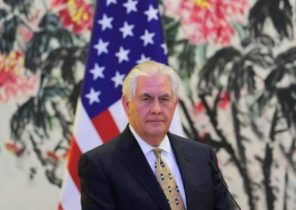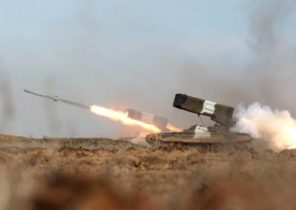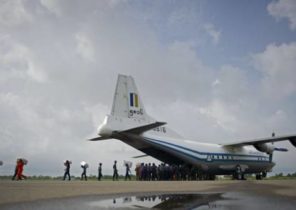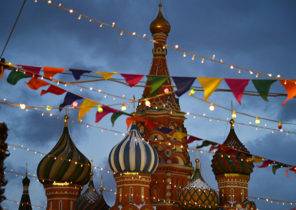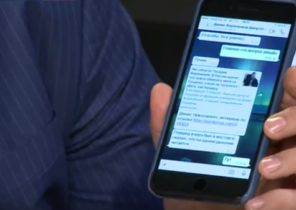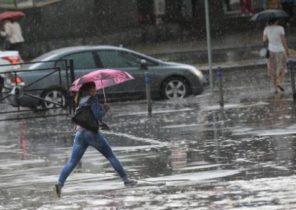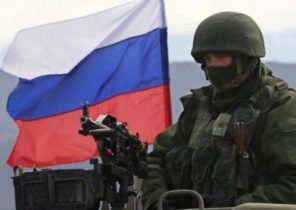
Trump’s administration faced its first serious test in the international arena: Sunday, January 29, in the East of Ukraine of the Russian artillery shells and rockets do not cease to pour on Ukrainian government troops, re-igniting a frozen conflict and killing Ukrainian soldiers.
The intensity of the shelling along with the renewed offensives by Russia-backed separatists and Ukrainian troops near the industrial city of Avdeevka which is under government control, rose sharply on Sunday, January 29. A day earlier, the President of the United States Donald trump and the President of Russia Vladimir Putin held his first telephone talks during which they discussed the formation of a new Alliance to fight against ISIS (a terrorist organization banned in Russia — approx. ed.) and cooperation between the two countries in various issues.
An international body whose mission includes the recording of violations of the terms of the Minsk agreement, reported at least 2300 or explosions caused by nearby artillery and mortars, which occurred only on Sunday, i.e. the day after the telephone conversation, trump and Putin. According to representatives of the Organization for security and cooperation in Europe, they recorded a sharp increase in the intensity of the shelling: the fighting was so intense that the representatives of this organization were not able to conduct accurate calculations.
Obviously, the Ukrainian troops also continue pushing deep into the neutral zone, which separates the territory controlled by the government, from the districts held by the militias. Apparently, therefore, they seek to strengthen their positions in the case in the near future they will again have to sit at the negotiating table.
Sympathy trump against Russia and his telephone conversation with Putin in Kiev has caused among NATO members fear that trump may conclude with Moscow a deal in which the U.S. will reduce the level of support for the Ukrainian government and may give Russia greater freedom in its attempts to destabilize the country.
According to one official of the U.S. defense Department, who asked to keep his name a secret, the Pentagon had long anticipated a surge of Russian aggression in Ukraine, as Moscow had to check “what action it might take” under the administration of the trump.
The resumption of fighting, and received on Wednesday, February 1, reports that a Ukrainian transport plane came under fire from the Russians, indicate that “Russians are not ready to make conciliatory gestures,” said Alexander Vershbow (Alexander Vershbow), which until late last year served as Deputy Secretary General of NATO.
According to him, the Kremlin, “may be trying to test the new administration to find out how she distanced itself from Kiev, and then to explain [the Ukrainian President] Petro Poroshenko that he will have to sign an agreement with Russia that will surely destroy his political reputation.”
Wednesday, February 1, at the question of how does the new administration the resumption of fighting in Ukraine is a direct challenge on the part of Russia, a White house spokesman Sean Spicer (Sean Spicer) said, “We are watching the situation in Ukraine.” Earlier, the state Department issued a statement in which he condemned the violation of the terms of the Minsk agreement, signed in 2014, but which were not even mentioned.
On Tuesday, January 31, the UN security Council expressed its “deep concern” about the “dangerous deterioration of the situation” in Eastern Ukraine and urged both sides to suspend hostilities.
According to the above-mentioned officials of the defense Ministry, Moscow has little reason to follow the Minsk agreement on ceasefire. “Moscow is very beneficial to a bleeding wound on the political establishment of Ukraine remained open because it gives Russia the opportunity to manipulate the situation and politics in this country, thus holding it at its kleptocratic post-Soviet orbit,” he explained.
Europe and the United States was quite difficult to resist the Russian-Ukrainian conflict, even when in Europe there was more unity and the transatlantic link was still strong.
In his speech at the meeting of the house Committee on the armed forces Wednesday, February 1, former CIA Director David Petraeus (David Petraeus) said that Putin understands very well “that, although the traditional aggression may allow Russia to capture a little alien lands on its periphery, the true center of gravity is the political will of the major democratic powers and their willingness to defend the Euro-Atlantic institutions such as NATO and the European Union”.
However, the surge of nationalism and the growing disagreements between Brussels and Washington seriously hampered the development of common response to Russia’s aggression. According to Franklin Holcomb (Holcomb Franklin) from the Institute for the study of war, these fights are “a test of how well Washington and Europe will be able to coordinate their actions” in the event of a crisis.
One of the main points of disagreement were the sanctions that the United States and the European Union imposed against Russia in connection with the annexation of Crimea and invasion of Ukraine in 2014. If Washington decides to cancel the sanctions — what trump has repeatedly hinted — Europe is likely to lose its resolve in this matter, what will be Putin’s major diplomatic and economic victory.
While some administration officials continue to trump the public to stick to the usual approach to Russia. Monday, January 30, the new U.S. Ambassador to the UN, Nikki Haley (Nikki Haley), along with his colleagues at the UN held talks with representatives of Israel, the United Kingdom, France and, most notably, Ukraine. According to an official statement, she reaffirmed U.S. readiness to support “the sovereignty and territorial integrity of Ukraine.”
But not only the Ukrainians are trying to understand how strongly the United States is ready to confront any possible threat from Russia. American and German tanks, and thousands of NATO troops, take up positions in the Baltic States to reassure its citizens, who fear a possible invasion of Russia. These temporary deployments were planned by the Obama administration, however, now these plans can refuse.
During his election campaign trump has sharply criticized the U.S. military deployment in Europe, claiming that Europeans themselves should pay for its defense system. The deployment of 4 thousand NATO troops and 90 tanks in Eastern Europe is paid by the Initiative for a European security Fund which can be under the eye of trump and the head of the office of management and budget under U.S. President Mick Mulvaney (Mick Mulvaney), who wants to save money, reducing expenses of the Pentagon on foreign operations.
According to Vershbow, if the costs reduce, it will become “a powerful blow to solidarity” with Europe.
“For Russia it will turn out to be a great success, which it will try to use to convince countries such as Bulgaria and the Czech Republic, that rely on US not.”
